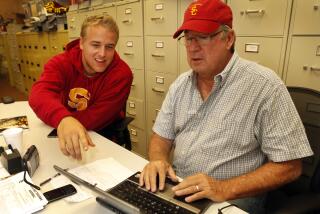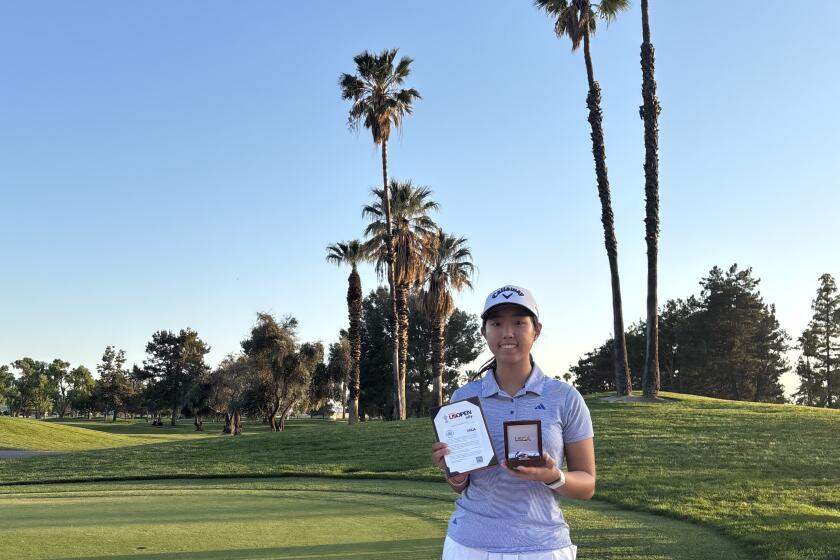IRON WILL
- Share via
Glendale — Terry-Jo Myers spent New Years’s Eve in front of a television set, watching a videotape of her surprise victory at the 1997 Los Angeles Women’s Championship.
“I never watch myself play,” Myers said. “But I wanted to enjoy every last bit of that one.”
Her family gathered around. They watched Myers hit a nine-iron out of the trees to set up a birdie onthe 16th hole. They watched her sink a four-foot putt to cap a final-round 66, good enough to win by two strokes.
And when the tape ended, Myers got teary-eyed just like that afternoon at Oakmont Country Club a year ago.
“Extremely emotional,” she said. “That tournament was something very special.”
It was the beginning of a different kind of life for this unassuming 35-year-old Florida golfer.
The women whom returns to defend her title at the $650,000 LPGA event on Friday is no longer an unknown, no longer able to retreat to the seclusion of family and friends. Now she lives in the spotlight, her fame reaching beyond the world of golf.
“There will never be another year like the one I just had,” she said. “It opened up a can of worms.”
Oakmont has drawn an unusually strong field this year. As players race for points to qualify for the upcoming Solheim Cup--the women’s equivalent to Ryder Cup--all but a few of the Top-100 have committed to play.
But before Myers could think about facing the likes of Annika Sorenstam and Karrie Webb, she made a harried trip to Washington, D.C.
There were congressmen and senators to schmooze. She also testified before a House subcommittee.
As many people learned after her victory last year, Myers suffers from interstitial cystitis, an incurable bladder disease that forced her to go to the bathroom as many as 50 times a day.
The malady was so painful that one night in 1992 she took a kitchen knife and was prepared to attempt suicide. Only when she walked into her daughter’s bedroom to say goodbye did Myers reconsider.
Her life and career were saved three years ago by a drug, Elmiron, that eliminated the disease’s symptoms.
Now Myers is campaigning for money to find a cure.
“We walk up and down the halls and she talks to congress people and senators and their aides,” said Debra Slade, executive director of the Interstitial Cystitis Assn. “I suspect very few celebrities would do that, but she is such a lovely, easy-going person.
“There’s absolutely no pretension to her.”
Though Myers has been a spokeswoman for the association since 1994, few people listened until she won at Oakmont, until a tearful press conference before print and television reporters.
“I never meant to explain everything,” she said. “But I was numb. I needed to explain that my tears had very little to do with winning the tournament.”
LPGA Commissioner Jim Ritts recalled: “I said at the time that it would be one of the most popular stories of the year and it was. There was great golf and great drama involved.”
In the ensuing months, Myers received hundreds of letters from women who suffer from the disease. “Inside Edition” and “Hard Copy” came calling. There were book and movie deals that she eventually turned down.
“Any TV movie would have to be changed to make it more sensational,” she said. “That’s just not who I am or what I’m about.”
Notoriety has proved troublesome for a woman who prefers the company of her husband, Gary Mundy Jr., and 8-year-old daughter, Taylor-Jo.
“I’m no longer the golfer that just goes out to play golf and goes back to the hotel room,” she said. “I have to share my life with other people and I’m a very private person. Time has been taken away from my family, which has been difficult.
“I can’t just lay on the couch and take a nap.”
*
*
At this point, Myers is glad to talk golf. That’s another story.
It begins with a naturally fluid swing and a string of amateur titles, a talent crippled when she began feeling pain “like paper cuts” in her abdomen at age 21.
Her first decade on the tour was pure survival. LPGA rules prohibit players from leaving the course for any reason, so there were tournaments where she withdrew in the middle of a round simply to go to the bathroom.
“She was very, very sick,” Slade said. “I knew how hard it was for her just to walk. I couldn’t believe she could play.”
When the 1988 Mayflower Classic was interrupted by two rain delays, Myers got her restroom breaks and won.
But only after she began drug therapy, in 1995, could she truly focus on the game.
Her coach, Andrew Rice, describes her as quietly competitive. Determination hidden in a thin 5-foot-9 frame. Killer instinct disguised by blond hair that falls gently to her shoulders.
“Loves to beat your brains out,” said Rice, who teaches at the David Leadbetter Golf Academy in Bradenton, Fla. “Once she overcame her disease, she needed something else to battle.”
So they set about transforming her long swing into a crisper, shorter motion less likely to falter under duress.
The adjustment was tough for a “feel” player. Myers missed the cut at a number of tournaments but, when she felt right, the results were startling.
“She had three opportunities to win last year and she won twice and the other time she birdied two out of the last five holes and lost by one stroke,” Rice said. “She did fantastic.”
Myers followed her victory at Oakmont with another title at the Sara Lee Classic in Nashville, Tenn., in May. She finished No. 22 on the money list with $313,015--almost as much as she had won the previous seven years combined.
All of which makes her a threat to repeat this week.
“It shocks me when I hear that,” she said. “It’s a whole different perspective.”
*
*
Her defense will be mounted on a course that ranks as one of the most beautiful and challenging stops on the tour, a course that Amy Alcott once called “the best-kept secret in Los Angeles.”
Nestled at the foot of the Verdugo Hills, its narrow fairways are guarded by stands of eucalyptus, cypress and oak.
Years ago, when the club hosted a now-defunct tournament, members confided to the pros that “all the putts break toward Glendale,” which prompted Alcott to ask: “Where the hell is Glendale?”
Oakmont is the kind of course that excites Myers. She likes having to move the ball around, having to constantly position herself for the next shot.
“She loves to compete,” Rice said.
But first, Myers has other business to finish. She invited her 76-year-old father to accompany her to Oakmont and they will use the practice round as a guided tour.
“I want to show him all the places I was [last year],” she said. “I’m going to drop the putts in all the same places.”
There will also be interviews to sit through, questions she will patiently answer before returning to her hotel room.
“I think that my quiet life is gone for a while,” she said. “But I’m very elated that the story [of interstitial cystitis] is of interest.”
And Myers knows that fame comes hand-in-hand with another development. “It means I’m playing good golf,” she said.
More to Read
Go beyond the scoreboard
Get the latest on L.A.'s teams in the daily Sports Report newsletter.
You may occasionally receive promotional content from the Los Angeles Times.











